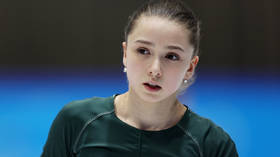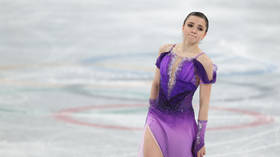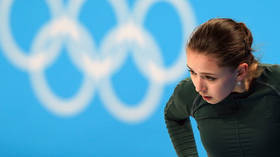Anti-Russian agenda comes before facts in Western media’s Valieva frenzy
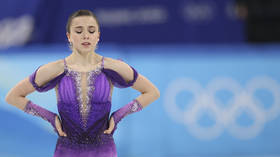
In the end, Kamila Valieva just about managed to keep it together in the glaring spotlight on the Beijing ice on Tuesday.
There was an uncharacteristic slip, but even on an off-day, Valieva’s performance was still enough for the 15-year-old to lead the field after the women’s Olympic figure skating short program.
With the weight of the world on her slender shoulders, Valieva remained a cut above the competition.
The tears did come, followed by hugs from her team, but the Russian teenager did not bend or break, despite many seemingly being desperate for her to do so.
Valieva did not brave the media after her performance, but quite frankly, who could blame her. It’s not hard to imagine the kind of inquisition she would have faced.
If many in the Western media had their way, Valieva wouldn’t even have been among the 30-strong field in the Chinese capital on Tuesday.
Still smarting that Valieva had been cleared to compete, some US pundits in particular indulged in pettiness as she floated across the ice.
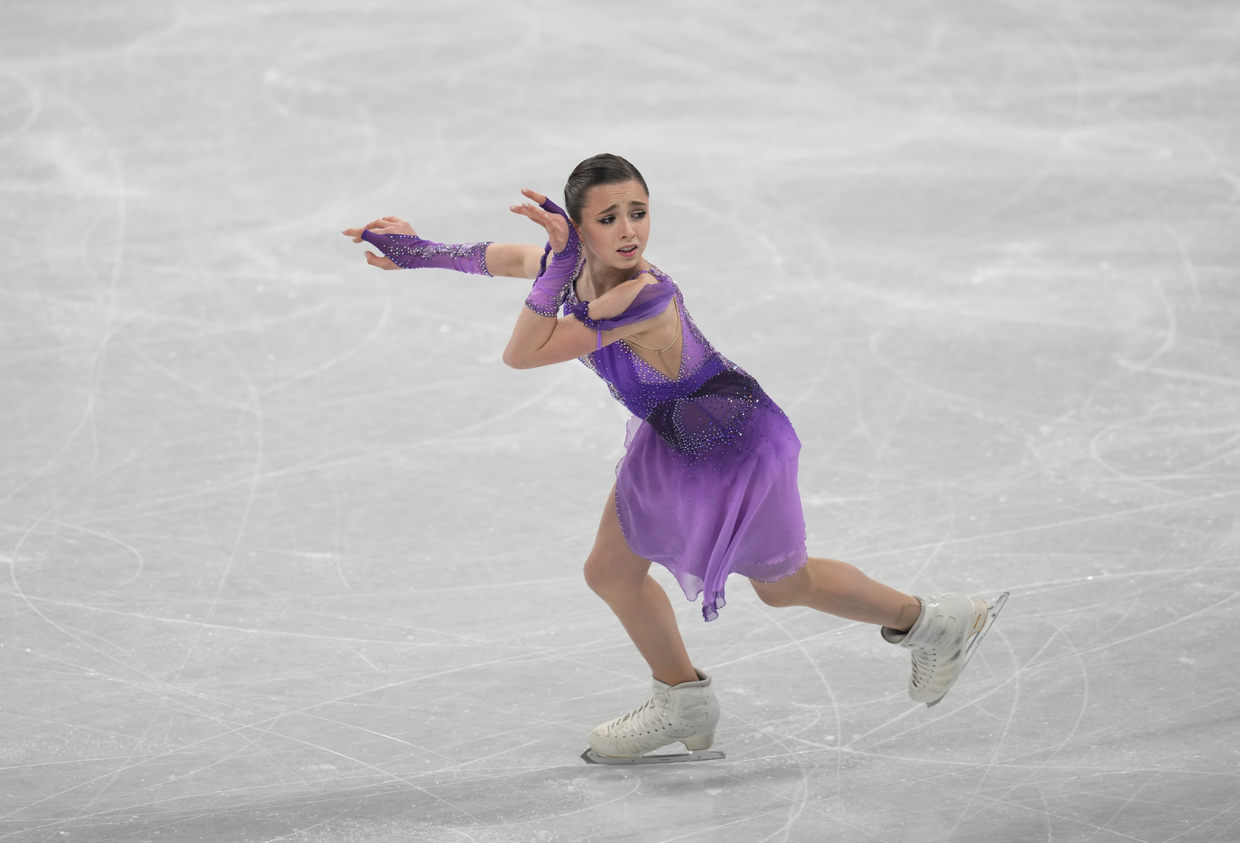
In her flowing purple dress, Valieva’s elegant, graceful appearance was in stark contrast to the ugly delirium that has arisen since her positive doping test was reported last week.
To offer just a sampling of the bile on offer, USA Today columnist Christine Brennan has demanded that Russia be banned from the next two versions of the Olympics.
“Just once, wouldn’t it be great if some IOC leader at a press conference said what the rest of the world knows: that Russia’s obsession with cheating has plunged another Olympics into chaos, potentially ruining the experience for dozens of innocent athletes?” Brennan screeched on Twitter.
Brennan in particular seemed to take perverse pleasure in seeing Valieva slip during her short skate routine, lamenting that “of course she should not be in this competition.”
Kamila Valieva with a major mistake on her triple axel — messy with a big step out — and a shaky performance overall. Tears at the end, tears as she left the ice. Still moves into first place. Of course she should not be in this competition.
— Christine Brennan (@cbrennansports) February 15, 2022
Being bitter about Russia comes naturally to someone who relentlessly whined as Alina Zagitova won gold at the Olympics in South Korea four years ago – and on that occasion it didn’t even have anything to do with doping claims.
The orgy of speculation surrounding Valieva continued on CNN, where Brennan tag-teamed with Travis Tygart, head of the US Anti-Doping Agency (USADA).
The word “cheat” has been bandied around freely – also appearing in the latest hit piece by Russia-bashing sports columnist Dan Wetzel.
“IOC has effectively cleared the way for Russia to cheat forever,” yelled the headline above his article on Yahoo! Sports.
“Russia cheated. Russia cheats. Russia runs a system where someone is doping kids… Certainly no one is going to stop it from abusing children, let alone the system.”
The problem with Brennan, Wetzel and many others of their ilk is that information is being presented as fact, long before Valieva’s case has even had a chance to be heard properly through the correct channels.
We are less than 10 days removed from the news of her positive sample being reported, and even less time has elapsed since it was formally announced by the International Testing Agency (ITA).
The hasty and hurried nature of the case was noted by the Court of Arbitration for Sport (CAS) in the verdict on Monday which cleared Valieva for further competition in Beijing.
The circumstances of the positive test from December 25, taken at the Russian national championships, have not had a chance to be explained fully.
Even officials at the International Olympic Committee (IOC) – which, let’s remember, had been among those seeking to suspend Valieva – have said the rampant speculation is out of hand.
“I would remind you that this case has not yet concluded, CAS made that very clear,” IOC spokesman Mark Adams told the media on Wednesday.
“In fact, the B Sample hasn’t even been opened... The case is not even finished yet, so to make all these grand statements I think is a little bit premature.”
Somewhat ironically, IOC official Denis Oswald was called out by Valieva’s legal team on Tuesday for making information public while the case is ongoing.
Leaks and conjecture have very much been the order of the day, from high-level officials down to the gutter press.
That the Western media is indulging in hearsay and rumor is hardly surprisingly given the Russophobia which has long inhabited its pages; from ‘Russiagate’ to the current Ukraine crisis, narrative comes first, long before the facts have a chance to catch up.
Some have held Valieva’s situation up as a continuation of the allegations surrounding the Sochi 2014 Games, but even if you take claims of a rampant, government-coordinated Russian doping campaign at face value – and you would be wise not to – it’s hard to see Valieva in the middle of some nefarious new state-sponsored plot.
Her positive test stems from the Russian nationals, was collected by the Russian Anti-Doping Agency (RUSADA) and sent to a laboratory in Sweden accredited by the World Anti-Doping Agency (WADA). Surely if this was some deviant plan, the sample would never have got that far, or in a state which would allow it to end up testing positive?
As the IOC has noted, the B Sample has yet to be opened, and we still have disturbingly conflicting versions of why the positive result took so long to be declared, only emerging after Valieva had helped the ROC to victory in the team event in Beijing.
Moreover, the decision by a RUSADA disciplinary committee to lift Valieva’s provisional suspension in Beijing was vindicated by CAS – a body keen to stress its staunch neutrality.
For all the Western press purports to know, there is still so much more to be established in this case. Meanwhile, Russian officials have pointed out that Valieva repeatedly tested negative before and after the sample was collected – including in Beijing.
But never mind all that if you are a member of the Western media, for whom it’s storyline first, facts second. After all, why change a tried and tested method when it comes to Russia? It brings clicks, even if it doesn’t necessarily bring the truth.
It’s equally telling just how quickly moral scruples have gone out of the window. Often buried amid the scandal is Valieva’s age and status as a minor, something CAS noted in its verdict and yet has not stopped the mud being slung.
It did not impinge those breaking the initial story of Valieva’s positive test based on leaked information, nor those who ahead of Monday’s verdict excitedly shared a Twitter poll on whether Valieva would end up being deprived of her Olympic dreams or not. Nor has it stopped the hounding of Valieva whenever she is within earshot of some Western reporters in Beijing.
Just a few months ago, many of these same journalists were falling over themselves to pile sympathy on Simone Biles when she pulled out of the Tokyo Olympics – willfully ignorant of the role they played in building Biles up into some kind of mythical figure in the first place, burdened with the immense expectation under which she ended up cracking.
“Ah!” they will now say, “but Biles was not caught doping! Valieva is a different matter entirely!”
The issue with that argument is that, as much they are presenting it as a closed case, Valieva’s investigation is only getting started.
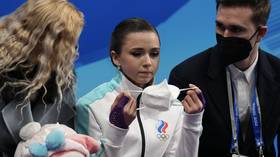
Amid it all, Valieva is the victim. Even if she goes on to win the gold medal on Thursday, somehow handling the immense pressure all over again, she will be stuck in limbo, not knowing if she will ever have that medal hung around her neck.
The coming months of legal wrangling will be most difficult for her and those close to her, even if that process must be allowed to play out fairly and transparently.
In the meantime, maxims of ‘innocent until proven guilty’ should not be applied to some and yet discarded for others, simply due to their nationality.
By Liam Tyler
The statements, views and opinions expressed in this column are solely those of the author and do not necessarily represent those of RT.
